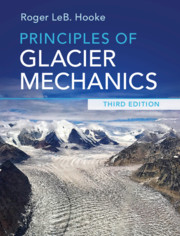Book contents
- Principles of Glacier Mechanics
- Reviews
- Principles of Glacier Mechanics
- Copyright page
- Dedication
- Contents
- Preface to the third edition
- Preface to the second edition
- Preface to the first edition
- Physical constants relevant to ice
- Derived SI units and conversion factors
- 1 Why study glaciers?
- 2 Some basic concepts
- 3 Mass balance
- 4 Flow and fracture of a crystalline material
- 5 The velocity field in a glacier
- 6 Temperature distribution in polar ice sheets
- 7 The coupling between a glacier and its bed
- 8 Water flow in and under glaciers: Geomorphic implications
- 9 Stress and deformation
- 10 Stress and velocity distribution in an idealized glacier
- 11 Numerical modeling
- 12 Applications of stress and deformation principles to classical problems
- 13 Ice streams and ice shelves
- 14 Finite strain and the origin of foliation
- 15 Response of glaciers to climate change
- 16 Ice core studies
- Problems
- References
- Index
4 - Flow and fracture of a crystalline material
Published online by Cambridge University Press: 20 December 2019
- Principles of Glacier Mechanics
- Reviews
- Principles of Glacier Mechanics
- Copyright page
- Dedication
- Contents
- Preface to the third edition
- Preface to the second edition
- Preface to the first edition
- Physical constants relevant to ice
- Derived SI units and conversion factors
- 1 Why study glaciers?
- 2 Some basic concepts
- 3 Mass balance
- 4 Flow and fracture of a crystalline material
- 5 The velocity field in a glacier
- 6 Temperature distribution in polar ice sheets
- 7 The coupling between a glacier and its bed
- 8 Water flow in and under glaciers: Geomorphic implications
- 9 Stress and deformation
- 10 Stress and velocity distribution in an idealized glacier
- 11 Numerical modeling
- 12 Applications of stress and deformation principles to classical problems
- 13 Ice streams and ice shelves
- 14 Finite strain and the origin of foliation
- 15 Response of glaciers to climate change
- 16 Ice core studies
- Problems
- References
- Index
Summary
This chapter leads off with a review of ice crystal structure and the role of dislocations in deformation. Rate-limiting processes are climb at high stresses, grain-boundary slip at intermediate stresses, and diffusion at low stresses. In polycrystalline ice, stress concentrations drive recrystallization by grain growth, polygonization, and nucleation of new grains. The latter and rotation of grains as slip occurs on basal planes leads to preferred orientations of c-axes, and softens the ice. Using a deformation mechanism map in grain size-stress space we show that early experiments spanned the boundary between dislocation creep and creep limited by grain boundary sliding. Much of the deformation in natural ice masses, however, occurs in the latter regime. Next, we introduced Glen’s flow law and related it to these creep mechanisms. Temperature and pressure are incorporated in the flow law by rigorous, physically-based modifications, whereas microfabric and water content must be included empirically. Finally, we introduced linear elastic fracture mechanics and used it to study crevasse depths. Fracturing weakens ice, and this may be included in the flow law with a damage factor.
Keywords
Information
- Type
- Chapter
- Information
- Principles of Glacier Mechanics , pp. 46 - 80Publisher: Cambridge University PressPrint publication year: 2019
